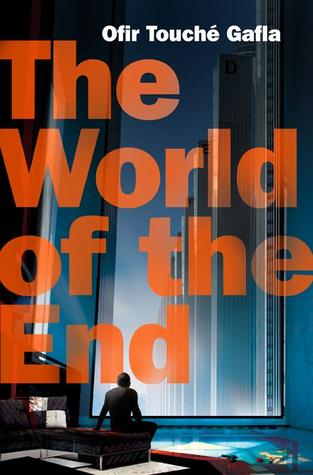 What started out so promising, full of cleverness and interesting mysteries, turned out being something I just wasn't enjoying and thus I had to put it down. There's just too much out there that spending time on something just to finish it will no longer be an activity I pursue.
What started out so promising, full of cleverness and interesting mysteries, turned out being something I just wasn't enjoying and thus I had to put it down. There's just too much out there that spending time on something just to finish it will no longer be an activity I pursue.Ben Mendelssohn commits suicide to be with his wife, Marian, who died a year earlier. He discovers a world, the Other World, that is both similar and completely different from our own world, but completely different from anything any religion has ever predicted.
It was impressive that Gafla is able to handle this topic without any religion at all, except maybe a passing mention at the beginning when Ben laughs at those around him for their misconceptions of the afterlife.
What's also impressive is Gafla's unique humor and creativity. Ben is an epilogist, which is a word that exists but not (that I've found) with the meaning that is given in this book. He rewrites endings, mostly to popular books. He's a genius at his job and saves even the best of writers from poor endings (I guess Stephen King could use his services eh?). In other words, he's a "righter." I loved the clever little details that pop up such as this, it's also what sold me from the beginning when I could have easily moved on to something else.
The World of the End [US] [UK] is also unique in that it follows Ben's pursuit of his wife, but alternates between random chapters following for instance the life of a photo or someone from the living world. These began as interesting and fun interludes, but they also take away from the narrative and make it a bit scattered and less cohesive of a narrative, at least until later in the book when they start to fit together a bit more ... well some of them.
As we enter back into Ben's new world, we discover this new world that is extremely well put-together. From the multi-wheel to the godget, we find out more and more of this world of Ben's death, but at the expense of Ben's character. All we know is that he's passionate about finding his wife, but that's about it. We learn about this interesting world, but it gets really hard to care at all about what happens.
And while the world is interesting, some of the things people do is just odd and mildly to deeply depressing. For instance, people don't have the need to eat, but they can and you have to do so immediately or you lose the desire to eat entirely. But this also goes for just about any other vice you want so you have people deliberately falling back into bad habits.
The following are more spoilery, so you've been warned:
Ben goes to meet his parents only to find out that while his father was dead, he fell in love with some one in the Other World and when his mother came to her death years later, she no longer mattered as much. Then, he finds that she really doesn't care either although she definitely did at first. But now she's found she enjoys being single.
So now Ben doesn't even know if Marian will even feel the same about him when he finally finds her.
Add to this the actor who takes his roles a bit to seriously, so much so that they make him a bit insane, or his pedophile brother whom he protects through attempted murder.
/End Spoilers
I just found these impossibly depressing. Yeah, people do feel this way and they probably would in such a world as Gafla has presented. But like I said, it depressed me to no end. Maybe people just change, but maybe it's because they've failed to work at it and they're selfish. The latter is more how it felt in this novel and its affect on other people, purely out of selfishness, is sad ... and did I mention depressing.
Maybe I'm a romantic (okay, I definitely am), but this novel just wasn't for me. I want to look forward to happiness, not more misery and sadness.
I fully acknowledge that I may be a unique case for this novel. As I mentioned, it's full of unique, clever, and even beautiful ideas and writing. I didn't enjoy it in the end, but then again I did enjoy plenty of things, it's all the pieces together that didn't work for me. I'm sure plenty will be highly impressed and enjoy it very much.
2 out of 5 Stars (did not finish, but enjoyed certain aspects)

